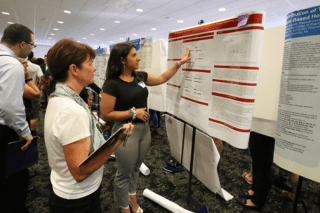URSCA Project- Kayla Sompel
Bloomsburg
Posted

The inspiration of becoming a pediatric oncologist and hematologist led Kayla Sompel to spend her summer conducting research as a part of URSCA (Undergraduate Research, Scholarly, Creative Activity) - a program at Bloomsburg University.
“I am studying the effects of clinical inhibitors used to treat aggressive, metastatic melanoma,” says Kayla Sompel, a biology major with a chemistry minor at BU. “Cancer is very complex, and I wanted as much exposure to the mechanisms of cancer as early as possible. This research will give me the background to continue ground-breaking cancer research as I move forward throughout my career.”
Sompel’s research is designed to do one very important thing and that is help save lives.
“According to the American Cancer Society, close to 10,000 people die each year from aggressive melanoma (stage 3 or 4),” says Sompel. “Once diagnosed with stage 3 or 4 melanoma, the survival rate decreases from 95% when it is caught early, to 15-20%. Much of this decrease is due to developed resistance to the drugs used in our study. By determining whether dual therapy can prevent this drug resistance from occurring, we can save many lives each year.”
This project will require Sompel to work with actual cancer cells to conduct her research and to have a strong knowledge of how cancer works.
“First, I will be treating human melanoma cell lines with three clinical inhibitors. I will then collect the samples following treatment and isolate the proteins. I then analyze the proteins by western blots,” says Sompel. “By analyzing the concentrations of proteins, I will be able to pinpoint the signaling pathway target area of each clinical inhibitor. This information can be used to investigate further whether dual drug therapy is more effective than individual drug therapy.”
She adds, “Cancer is made of normal tissues; that means cancer uses pathways that are normally available to our cells but are not regularly controlled as they are in normal cells. By studying the effects of these inhibitors, we can analyze how these cell signaling pathways are controlled in cancer and how to control them to control malignant tumors.”
Cancer is something that hits close to home for Sompel and she knows that her research may one day be able to help not only those around her but the global community as well.
“Overall, my research focuses on the global community, but I believe this research can also be considered local,” says Sompel. “I have two close friends that have previously been diagnosed with melanoma, so not only will my research help those close to me, but it will also help people around the world that suffer from melanoma.”
This URSCA project is a major stepping stone for helping her join the fight against cancer and kick-start her career.
“By getting laboratory experience, especially in a cancer-related field, it will give me the skills, respect, and knowledge to excel further into my medical career,” says Sompel. “By observing different ways to analyze and interpret results, I am preparing myself to become a developed and skilled scientific investigator and I can hopefully continue to improve the world with science.”



